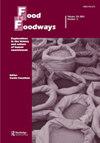The refrigerator as a problem and solution: Food storage practices as part of sustainable food culture
IF 1.1
Q2 ANTHROPOLOGY
引用次数: 1
Abstract
Abstract The aim of this paper is to explore how household food storage practices over time relate to environmental conditions and issues and how this has affected the practices and food culture. Through a bricolage of personal accounts, advertisements, magazine articles and kitchen guidelines, I use Sweden as the empirical example. Departing from the introduction of domestic refrigeration until today, I give particular attention to how different societal actors have framed refrigerated food storage as both solution and problem in relation to issues today linked to environmental sustainability, for example local climate conditions, energy consumption, depletion of the ozone layer and food waste. The paper also shows how people refigure the materiality of past storage to fit into modern-day life. The results, I argue, illustrate how food storage, as a culinary infrastructure, influence daily food practices and thereby understandings of sustainable food. The refrigerator and freezer have had a big impact on food culture. Hence, to encourage more sustainable food practices societal actors need to address and problematize culinary infrastructures and the ideas and values these convey regarding food and sustainability. The paper contributes with a cultural historical approach to how food related practices and infrastructures over time interlinks with different ideas of sustainability.冰箱是一个问题和解决方案:作为可持续食品文化一部分的食品储存实践
摘要本文的目的是探讨随着时间的推移,家庭食品储存实践与环境条件和问题之间的关系,以及这对实践和食品文化的影响。通过个人账户、广告、杂志文章和厨房指南的拼凑,我以瑞典为例。从引入家用制冷到今天,我特别关注不同的社会行动者如何将冷藏食品储存视为与当今环境可持续性相关的问题的解决方案和问题,例如当地气候条件、能源消耗、臭氧层消耗和食物浪费。该论文还展示了人们如何重新配置过去存储的物质性,以适应现代生活。我认为,研究结果表明,食品储存作为一种烹饪基础设施,如何影响日常饮食实践,从而影响对可持续食品的理解。冰箱和冷冻柜对饮食文化产生了重大影响。因此,为了鼓励更可持续的食品实践,社会行动者需要解决烹饪基础设施以及这些基础设施传达的关于食品和可持续性的理念和价值观,并将其问题化。本文从文化历史的角度探讨了随着时间的推移,与粮食相关的做法和基础设施如何与不同的可持续性理念相互联系。
本文章由计算机程序翻译,如有差异,请以英文原文为准。
求助全文
约1分钟内获得全文
求助全文
来源期刊

Food and Foodways
ANTHROPOLOGY-
CiteScore
2.20
自引率
0.00%
发文量
16
期刊介绍:
Food and Foodways is a refereed, interdisciplinary, and international journal devoted to publishing original scholarly articles on the history and culture of human nourishment. By reflecting on the role food plays in human relations, this unique journal explores the powerful but often subtle ways in which food has shaped, and shapes, our lives socially, economically, politically, mentally, nutritionally, and morally. Because food is a pervasive social phenomenon, it cannot be approached by any one discipline. We encourage articles that engage dialogue, debate, and exchange across disciplines.
 求助内容:
求助内容: 应助结果提醒方式:
应助结果提醒方式:


